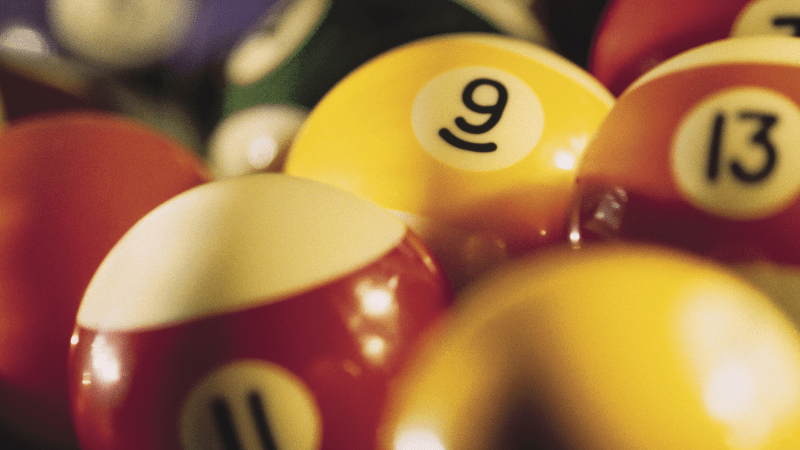One of the most important elements of having a pool table at home is routinely cleaning and maintaining all of its components. While it’s crucial to care for the table itself, owners shouldn’t neglect its accessories, such as the pool balls. Considering how other players handle many pool balls, they could easily transfer germs, dirt, and other contaminants from their hands to the ball to the table. To avoid this and promote optimal gameplay, you’ll want to clean them frequently.
There are several different ways pool table owners will opt to clean their pool balls. In this article, we’ll detail some of our preferred methods and show you how to use each step by step. We’ll also discuss what pool table owners can do to remove pool ball staining, in addition to regular cleaning.
Soak the Ball in Warm Water and Your Cleaner of Choice
The time has come to clean your pool balls. Maybe you’ve noticed that balls look or feel a bit grimy, or maybe they’re even causing some skidding when you play, which is affecting your accuracy.
Because pool balls come into contact with various things, from hands to the cue stick to the chalk on the cue stick to the table felt, and so much more, they can get really dirty fast. Therefore, to keep them in optimal shape, you’ll want to clean ideally after every use if you’re an avid pool player.
That being said, the worst thing you can do for your pool balls is clean them incorrectly and damage their exterior.
To properly clean pool balls, fill a clean sink or bucket with warm water and your cleaner of choice. It is important the water is at the proper temperature, as cold water won’t clean the balls as effectively, but hot water could damage the balls, especially if they’re acrylic or polyester-based.
In terms of the ideal cleaner, there’s a decent range of options available to you, but we prefer one of the two listed below:
- A mild soap or detergent, such as Dawn or Palmolive
- A specified pool ball cleaner, such as Aramith’s Billiard Ball Cleaner and Restorer.
You’ll want to refrain from opting for typical household cleaners, as most contain harsh chemicals that will bleach or damage your pool balls.
Add a moderate amount of soap or the ascribed amount of pool ball cleaner to the bucket of warm water and allow the balls to soak in the liquid for at least 15 minutes.
Scrub, Rinse, and Dry the Pool Balls
Soaking your bool balls will help loosen any grime sitting on their surface, making the next few steps easier.
After waiting the designated soak period, scrub each pool ball with a soft-bristled brush or a microfiber towel. Do not use hard-bristled brushes or other abrasive materials, as these will likely scratch the pool balls.
Now that you’ve scrubbed each pool ball individually, you can rinse it in warm water and then thoroughly dry it using a towel. It’s important you don’t allow the pool balls to air dry, as this will leave spots on their exterior and could potentially lead to the balls transferring soap particles to your pool table’s felt, damaging the material over time.
Remove Stains Using Baking Soda
By this point, all of your pool balls should look shiny and new, thanks to their thorough cleaning. However, suppose you notice upon further inspection that a few have some yellowing or staining. In that case, you’ll want to kick your cleaning regime up a notch.
To remove yellow stains from pool balls, mix one to two tablespoons of baking soda with small amounts of warm water until you create a moderately thick paste. Then, use a microfiber towel to rub the paste into every ball and rinse it off with cold water.
Water temperature is important again here, as rinsing the baking soda with warm or hot water could cause it to stick and dry onto the ball’s surface. After you’ve rinsed all of the pool balls thoroughly, use a dry towel to completely dry them.
Polish the Pool Balls Sparingly and Only If They Still Appear Dull
The final step to cleaning and rejuvenating your pool balls is to polish them if you notice they still look exceptionally dull after being cleaned and all stains are removed.
The best way to polish a pool ball at home is to use a polishing or restoring liquid made specifically for pool balls and apply it using a microfiber towel. Alternatively, if you have a ball polishing machine, you could use that instead.
A word of caution, though: many professional and competitive pool players don’t advise you polish or wax your pool balls unless they are in exceptionally rough shape. Applying polish to pool balls unnecessarily can make it difficult to execute a throw or spin-transfer shot and inhibit your shot consistency.
For the most part, as long as you clean the pool balls properly, they should look shiny and new without using a polish that might inhibit your game.

